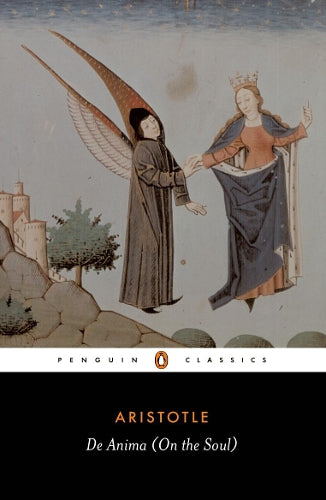De Anima (On the Soul)

Ratings/reviews counts are updated frequently.
Check link for latest rating. ( 6,589 ratings, 269 reviews)Read More
Found a better price? Request a price match

De Anima (On the Soul)
Book Hero Magic created this recommendation. While it's new and still learning, it may not be perfect - your feedback is welcome! IS THIS YOUR NEXT READ?
De Anima (On the Soul)
For Plato the soul was the seat of being, metaphysically distinct from the body that it was forced temporarily to inhabit. In 'De Anima', Plato's student, Aristotle sought to set out his theory of soul as the ultimate reality of embodied form and produced a masterpiece of philosophical insight.
Aristotle's De Anima (On the Soul) is a seminal work that delves into the profound and intricate nature of the soul, exploring its defining characteristics and functions. Aristotle embarks on a comprehensive examination of living organisms, scrutinising their myriad behaviours, sensory capabilities, and perceptual depth. His quest is to establish a cohesive theory of the soul that integrates the principles of logic and biology, positioning it as the fundamental essence of embodied form. This enduring masterpiece not only offers deep philosophical insight but also presents a psychology rich in nuanced subtlety.
For the pre-Socratic philosophers, the soul was primarily viewed as the source of movement and sensation, an essential force driving life and consciousness. Plato, Aristotle's mentor, expanded upon this idea, positing that the soul is the seat of being itself, metaphysically distinct from the physical body it temporarily inhabits. Dissatisfied with both views, Aristotle sought to critically examine these positions against the backdrop of emerging scientific knowledge.
In his inquiry, Aristotle traverses an extensive landscape of biological diversity. He meticulously observes the behaviour of various living entities, their capacities for movement, perception, and thought. Through this empirical investigation, he aims to illustrate that neither a purely materialistic reduction nor a Platonic elevation of the soul adequately captures its essence. Instead, Aristotle proposes that the soul is the ultimate reality of a living body, intricately connected to its physical form yet imbuing it with purpose and life.
In De Anima, Aristotle challenges us to rethink the relationship between the soul and body. He posits that the soul is not a separate, abstract entity but something that realises the potential of a living organism. This theory suggests that the soul encompasses various faculties such as nutrition, perception, intellect, and ultimately, life itself. Aristotle's exploration leads to groundbreaking conclusions about the nature of consciousness and the fundamental principles that govern living beings.
As you immerse yourself in the pages of De Anima, you will discover Aristotle's profound reflections on the intersections of mind, body, and spirit. His work remains a cornerstone of philosophical thought, influencing a wide range of fields from psychology to metaphysics. Whether you are a seasoned philosopher or a curiosity-driven reader, De Anima offers an enlightening journey into one of humanity's most persistent and essential questions: What is the nature of the soul?
Book Hero Magic summarised reviews for this book. While it's new and still learning, it may not be perfect - your feedback is welcome! HOW HAS THIS BEEN REVIEWED?
De Anima (On the Soul) by Aristotle is highly regarded for its philosophical exploration of the nature of the soul. Reviewers praise its comprehensive analysis of life, perception, and intellect, highlighting its influence on both ancient and modern thought. Many find it a challenging yet rewarding read, appreciating Aristotle's meticulous reasoning and profound insights.

Book Details
INFORMATION
ISBN: 9780140444711
Publisher: Penguin Books Ltd
Format: Paperback / softback
Date Published: 29 January 1987
Country: United Kingdom
Imprint: Penguin Classics
Contributors:
- Translated by Hugh Lawson-Tancred
Audience: General / adult
DIMENSIONS
Spine width: 28.0mm
Width: 128.0mm
Height: 196.0mm
Weight: 200g
Pages: 256
About the Author
Aristotle was born in 384BC. For twenty years he studied at Athens at the Academy of Plato, on whose death in 347 he left, and some time later became tutor to Alexander the Great. On Alexander's succession to the throne of Macedonia in 336, Aristotle returned to Athens and established his school and research institute, the Lyceum. After Alexander's death he was driven out of Athens and feld to Chalcis in Euboea where he died in 322. His writings profoundly affected the whole course of ancient and medieval philosophy. HUGH LAWSON-TANCRED was born in 1955 and educated at Eton and Balliol College, Oxford. He is a Departmental Fellow in the Department of Philosophy at Birkbeck College in the University of London. He has published extensively on Aristotle and Plato and is currently engaged in research in computational linguistics. He translates widely from the Slavonic and Scandinavian languages. His translations of Aristotle's The Art of Rhetoric and De Anima are also published in Penguin Classics. He is married with a daughter and two sons and lives in North London and Somerset.
Also by Aristotle
View allMore from Philosophy & Psychology
View allWhy buy from us?
Book Hero is not a chain store or big box retailer. We're an independent 100% NZ-owned business on a mission to help more Kiwis rediscover a love of books and reading!

Service & Delivery
Our warehouse in Auckland holds over 80,000 books and puzzles in-stock so you're not waiting for your order to arrive from overseas.

Auckland Bookstore
We're primarily an online store, but for your convenience you can pick up your order for free from our bookstore, which is right next door to our warehouse in Hobsonville.

Our Gifting Service
Books make wonderful thoughtful gifts and we're here to help with gift-wrapping and cards. We can even send your gift directly to your loved one.

































